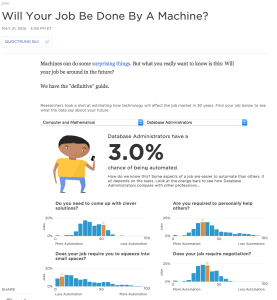NPR recently created what they’re calling the definitive guide to which jobs are at risk of being eliminated due to automation. I’ve been researching technological unemployment, and was recently considering a similar assessment. I found myself disagreeing with many of the NPR conclusions.
They concluded there was only an 18% chance of airline pilots jobs being automated, despite the fact that most of a pilot’s tasks are already automated today, and autopilots can take off, navigate, and land just fine. Nearly half of all pilots have fallen asleep mid-flight. If they took a first step of reducing the flight crew from two to one, that’s still 50% of the airline pilot jobs being eliminated. Consider that most of the large planes in the air today would have once been designed for a crew of three, including a flight engineer, and that the flight engineer’s position was eliminated largely through automation and computer controls. I would estimate chance of automation for pilots at 50% or above.
They also concluded there was only a 3% chance of database administrators losing their jobs to automation. What?!?! The last time I worked with a DBA was in 2001. Since then we’ve managed just fine using ORMs and new generations of DB schema migration tools, analysis tools, and generally more friendly and accommodating DB engines, all of which puts 95% of database tasks within everyday reach of software programmers. Sure, DBAs still have their role for more complex situations, where there is no substitute for the knowledge and expertise of an experienced DBA, but this represents maybe 10% of the cases where they once would have been involved. I would estimate chance of automation for DBAs at 80% or above.
They gave elementary and high school teachers a 1% or less chance of being automated, but middle school teachers a 17% chance of being automated. That makes no sense.
Physicians also got a 0.4% chance of being automated, even though IBM’s Watson has already demonstrated it is better at diagnosis than human doctors.
In sum, I think the NPR report is flawed. They have lovely graphics, and a nice tool for exploring, but the data that it’s based on just doesn’t make sense.







NPR Report on Technological Unemployment – via @hertling https://t.co/bpa5WMpEzd